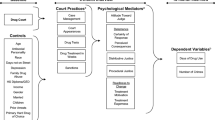Abstract
Adaptive interventions apply a priori decision rules for adjusting treatment services in response to participants’ clinical presentation or performance in treatment. This pilot study (n = 30) experimentally examined an adaptive intervention in a misdemeanor drug court. The participants were primarily charged with possession of marijuana (73%) or possession of drug paraphernalia (23%). Results revealed that participants in the adaptive condition had higher graduation rates and required significantly less time to graduate from the program and achieve a final resolution of the case. It took an average of nearly 4 fewer months for participants in the adaptive intervention to resolve their cases compared with those participating in drug court as usual. Participants in the adaptive condition also reported equivalent satisfaction with the program and therapeutic alliances with their counselors. These data suggest that adaptive interventions may enhance the efficiency and effectiveness of drug courts and justify examining adaptive interventions in large-scale drug court studies.
Similar content being viewed by others
References and Recommended Reading
Collins LM, Murphy SA, Bierman KA: A conceptual framework for adaptive preventive interventions. Prev Sci 2004, 5:185–196.
Murphy SA: An experimental design for the development of adaptive treatment strategies. Stat Med 2005, 24:1455–1481.
Murphy SA, Lynch KG, McKay JR, et al.: Developing adaptive treatment strategies in substance abuse research. Drug Alcohol Depend 2007, 88:S24–S30.
Reid R, Pipe A, Higginson L, et al.: Stepped care approach to smoking cessation in patients hospitalized for coronary artery disease. J Cardiopulm Rehabil 2003, 23:176–182.
Brooner RK, Kidorf MS, King VL, et al.: Behavioral contingencies improve counseling attendance in an adaptive treatment model. J Subst Abuse Treat 2004, 27:223–232.
Brooner RK, Kidorf M, Stoller KB, et al.: Comparing adaptive stepped care and monetary-based voucher interventions for opioid dependence. Drug Alcohol Depend 2007, 88:14–23.
Kidorf M, Neufeld K, Brooner RK: Combining stepped care approaches with behavioral reinforcement to motivate employment in opioid-dependent out-patients. Subst Use Misuse 2004, 39:2215–2238.
King VL, Stoller KB, Hayes M, et al.: A multicenter randomized evaluation of methadone medical maintenance. Drug Alcohol Depend 2002, 65:137–148.
Kidorf M, Neufeld K, King VL, et al.: A stepped care approach for reducing cannabis use in opioid-dependent outpatients. J Subst Abuse Treat 2007, 32:341–347.
Breslin FC, Sobell MB, Sobell LC, et al.: Problem drinkers: evaluation of a stepped-care approach. J Subst Abuse 1999, 10:217–232.
O’Malley SS, Rounsaville BJ, Farren C, et al.: Initial and maintenance naltrexone treatment for alcohol dependence using primary care versus specialty care: a nested sequence of 3 randomized trials. Arch Intern Med 2003, 163:1695–1704.
National Association of Drug Court Professionals: Defining Drug Courts: The Key Components. Washington, DC: Office of Justice Programs, US Department of Justice; 1997.
Arabia PL, Fox G, Caughie J, et al.: Sanctioning practices in an adult felony drug court. Drug Court Rev 2008, 6:1–31.
Marlowe DB: Strategies for administering rewards and sanctions. In Drug Courts: A New Approach to Treatment and Rehabilitation. Edited by Lessenger JE, Roper GF. New York: Springer; 2007:317–336.
Marlowe DB: Application of sanctions. In Quality Improvement for Drug Courts: Evidence-based Practices. Edited by Hardin C, Kushner JN. Alexandria, VA: National Drug Court Institute; 2008:107–114.
Marlowe DB, Wong CJ: Contingency management in adult criminal drug courts. In Contingency Management in Substance Abuse Treatment. Edited by Higgins ST, Silverman K, Heil SH. New York: Guilford; 2008:334–354.
Aos S, Miller M, Drake E: Evidence-based Public Policy Options to Reduce Future Prison Construction, Criminal Justice Costs, and Crime Rates. Olympia, WA: Washington State Institute for Public Policy; 2006.
Latimer J, Morton-Bourgon K, Chretien J: A Meta-analytic Examination of Drug Treatment Courts: Do They Reduce Recidivism? Ottawa, Ontario, Canada: Canada Department of Justice, Research & Statistics Division; 2006.
Lowenkamp CT, Holsinger AM, Latessa EJ: Are drug courts effective: a meta-analytic review. J Community Correct 2005, Fall:5–28.
Shaffer DK: Reconsidering Drug Court Effectiveness: A Meta-analytic Review. Las Vegas, NV: Department of Criminal Justice, University of Nevada; 2006.
Wilson DB, Mitchell O, MacKenzie DL: A systematic review of drug court effects on recidivism. J Exp Criminol 2006, 2:459–487.
Bhati AS, Roman JK, Chalfin A: To Treat or Not to Treat: Evidence on the Prospects of Expanding Treatment to Druginvolved Offenders. Washington, DC: The Urban Institute; 2008.
Aubrey F, Berman G: Going to scale: a conversation about the future of drug courts. Court Rev 2002, Fall:4–13.
Farole DJ, Puffett N, Rempel M, Byrne F: Can Innovation Be Institutionalized? Problem-Solving in Mainstream Courts. New York: Center for Court Innovation; 2004.
Sobell MB, Sobell LC: Stepped care as a heuristic approach to the treatment of alcohol problems. J Consult Clin Psychol 2000, 68:573–579.
Rothbard A, Alterman A, Rutherford M, et al.: Revisiting the effectiveness of methadone maintenance treatment on crime reductions in the 1990s. J Subst Abuse Treat 1999, 16:329–335.
Marlowe DB, Patapis NS, DeMatteo DS: Amenability to treatment of drug offenders. Fed Probat 2003, 67:40–46.
Marlowe DB, Festinger DS, Arabia PL, et al.: Adaptive interventions in drug court: a pilot experiment. Crim Just Rev 2008, 33:343–360.
Festinger DS, Marlowe DB, Lee PA, et al.: Status hearings in drug court: when more is less and less is more. Drug Alcohol Depend 2002, 68:151–157.
Marlowe DB, Festinger DS, Dugosh KL, et al.: Adapting judicial supervision to the risk level of drug offenders: discharge and six-month outcomes from a prospective matching study. Drug Alcohol Depend 2007, 88S:4–13.
Marlowe DB, Festinger DS, Lee PA, et al.: Matching judicial supervision to clients’ risk status in drug court. Crime Delinq 2006, 52:52–76.
American Psychiatric Association: Diagnostic and Statistical Manual of Mental Disorders, edn 4 (text revision). Washington, DC: American Psychiatric Association; 2000.
Luborsky L, Barber JP, Siqueland L, et al.: The revised Helping Alliance Questionnaire (HAq-II) psychometric properties. J Psychother Pract Res 1996, 5:260–271.
Ganju V, Beall MA, Callahan N, et al.: The MHSIP Consumeroriented Mental Health Report Card. Washington, DC: Center for Mental Health Services (SAMHSA, DHHS); 1996.
Cohen J: Statistical Power Analysis for the Behavioral Sciences, edn 2. Hillsdale, NJ: Lawrence Erlbaum Associates; 1988.
Marlowe DB, Festinger DS, Foltz C, et al.: Perceived deterrence and outcomes in drug court. Behav Sci Law 2005, 23:183–198.
Burke K, Leben S: Procedural fairness: a key ingredient in public satisfaction. Court Rev 2007, 44:4–24.
Author information
Authors and Affiliations
Corresponding author
Rights and permissions
About this article
Cite this article
Marlowe, D.B., Festinger, D.S., Arabia, P.L. et al. Adaptive interventions may optimize outcomes in drug courts: A pilot study. Curr Psychiatry Rep 11, 370–376 (2009). https://doi.org/10.1007/s11920-009-0056-3
Published:
Issue Date:
DOI: https://doi.org/10.1007/s11920-009-0056-3




